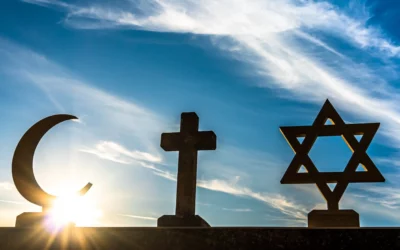
Written by William C. Duncan
June 21, 2023

A few years ago, the Missionaries of Charity, an order of Catholic nuns, opened a soup kitchen in north St. Louis. One of the guests, Ildron, who came to the kitchen on its first day,
described how the Missionaries of Charity helped her at her lowest point. Facing a drug addiction and mental illness, Ildron came to the emergency shelter for a while. “They took me in when I didn’t have anything. … They prayed with me, they helped me.” When she finally landed her own place, “they helped me get a little furniture and stuff. I had no food, so I came back and they gave me food.”
For some, the phrase “organized religion” is pejorative, suggesting formalism and constraints in a culture that prizes individualism.
There are distinct advantages, however, to religious organizations. Shaina Huleatt, an attorney with the Bruderhof community, provided a powerful illustration of this reality in a presentation at the Religious Freedom Annual Review, sponsored by BYU last week, in which she described the Bruderhof.
The Bruderhof is a worldwide movement in the Anabaptist tradition that began in 1920. Inspired by the early Christian church described in the New Testament book of Acts, the Bruderhof live in “over two dozen individual settlements.” As Huleatt explained, a Bruderhof community is like a monastery with families.
The community’s website explains the primacy of community in the faith of the Bruderhof:
Some of our settlements are individual houses; others look more like small villages with a population of two to three hundred people. … None of us owns anything personally, and our communal property belongs not to us as a group but to the cause of Christ. Anyone who has decided to become a member freely gives all property, earnings, and inheritances to the church community. In turn, all necessities such as food, housing, and health care are provided for. Members generally work for and in the community, but none of us receives a paycheck, stipend, or allowance. … Families are the basic unit of the Bruderhof community and each child’s education starts in the home with their parents, both in the routine of daily home life and meals and in the many outdoor activities that are available. Shared childcare and schools are on the grounds of the Bruderhof. Older people and those without families of their own often live near families with younger children, providing mutual support and companionship.
Huleatt noted that much of what we mean when we talk about religion is what we do with and for others. For the Bruderhof, like many people of faith, religious beliefs influence every area of daily life, not only what individuals do in a formal religious setting.
In reality, “organized religion” is as likely to refer to a soup kitchen as a church. Huleatt noted that it is “hard for an individual to run a soup kitchen alone.” Having an organization to secure a building or insurance can make the difference between being able to serve or having to forego the opportunity to meet a need.
A large percentage of pantries that provide food for those in need are operated by religious groups.
So protections for churches and other religious organizations, as well as for individual religious exercise, are important.
Indeed, there are some important pending court cases about whether churches can operate soup kitchens when government restrictions would prevent that. Of course, local governments can enforce safety and other regulations in the operation of these services, but wise policymakers will look for ways to allow people of faith and the organizations they form to exercise their beliefs, since doing so benefits entire communities.
People of faith, too, would be wise to understand and be able to explain the ways that religious practice – both of religious organizations as well as individuals – benefits entire communities and nations.

Insights: analysis, research, and informed commentary from Sutherland experts. For elected officials and public policy professionals.

-
The phrase “organized religion” is as likely to describe a soup kitchen as a church.
-
The Bruderhof Christian movement, which forms religious communities, illustrates how important community is to practicing faith.
-
Since people of faith often exercise their faith working together with others, religious protections should focus not just on individual exercise, but also on religious organizations.
Read More
Looking at Supreme Court and religious freedom through the lens of the presidential campaign
Two constitutional issues highlight similarities and differences between the Biden and Trump administrations.
Education policy to consider during the 2024 election season
Here’s a look at what each presidential candidate is likely to focus on in education, given their track records and campaign platforms.
Ignoring the text of the Constitution is a mistake
A written Constitution is entirely superfluous if the document is simply meant to give the people what they want.


